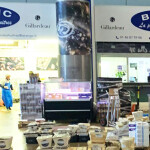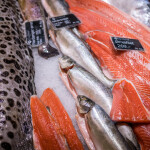Costco Wholesale Corp. had been somewhat quiet about its seafood sustainability initiatives until this week, when Greenpeace commended the retailer for its move toward sustainability. Greenpeace said that the Issaquah, Wash.-based retailer would move up from 17th place in the environmental activist organization’s “Carting Away the Oceans” seafood sustainability rankings in 2010, to a much higher position on this year’s rankings, which are due to be released in April. While Costco is making news now, Jeff Lyons, club-store chain’s senior VP of perishables, told SeafoodSource that the chain has been working aggressively on its seafood sustainability efforts for four years.
Soon after the news broke that Costco had revised its sustainable seafood policy, SeafoodSource Contributing Editor Christine Blank talked to Lyons about Costco’s seafood sustainability priorities and Greenpeace’s role in the matter.
Blank: Why do you think Costco will be moving up on Greenpeace’s seafood sustainability rankings this year?
Lyons: We continue to do what we think is right, but we haven’t been real big about explaining that or sharing that. We responded to [Greenpeace’s] surveys this year and, in the past, we haven’t. In the past, we said, “We have a business to run,” and chose not to do it. This year, having been in a dialogue with them, we said we would fill out the survey. Some might say, “Costco is a big retailer. They are depleting the oceans.” Of the 23 red-listed fish (according to the the World Wildlife Fund’s “Red List”), we only carry 10 of them.
Costco had already stopped selling seven seafood species that are considered to be at risk, and now the retailer has said it will not sell an additional five species. What are those five species, and which resources did you use when deciding not to sell them?
We added Greenland halibut, grouper, monkfish, redfish and skates [and rays]. We had been selling some skates in Asia. The Marine Stewardship Council (MSC) will show you which fisheries have been validated and which ones are in process. Another good resource is National Oceanic and Atmopsheric Adminsitration. We are looking for different resources too, to make sure that we have good information.
Costco’s new sustainability standards include measures for shrimp, tilapia, canned tuna and farmed salmon. Which of these species are Costco’s priority?
Farmed salmon. We already have wild salmon that is sustainable. Now we need farmed salmon to keep moving along that dialogue. It is a great resource for our consumers, and provides a healthy, high omega-3 product. As the population grows around the world, we need to increase those resources but not deplete our oceans. We have to make sure farming is a part of that.
What is happening with sustainability certification for tilapia? In its new sustainability policy, Costco said that by the end of 2011 it will buy tilapia only from suppliers who have been verified under the Tilapia Aquaculture Dialogue or comparable third-party standards by the Aquaculture Stewardship Council or other reputable certifying agency.
Tilapia aquaculture certification is going to be done through ACS, but all the pieces are not in place yet. We are going and getting audits from our vendors, and some of those vendors were on the task force for TAD.
Since Costco has stores in many different countries, how are the retailer’s sustainability efforts perceived elsewhere?
One of the measures that is very hard to understand in Asia is why we don’t sell bluefin tuna. It is very common to eat there. We explain why, for us as a company, that is not the right statement to make. We can sell just about anything, and we can also choose not to sell anything. They understand that, and in Asia, there is a great deal of respect for the [Costco] corporate group.






